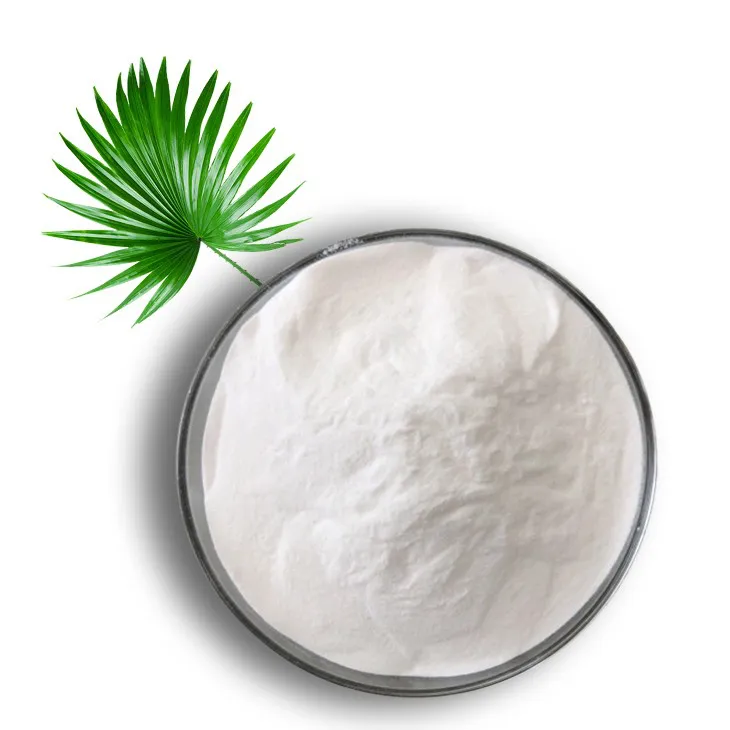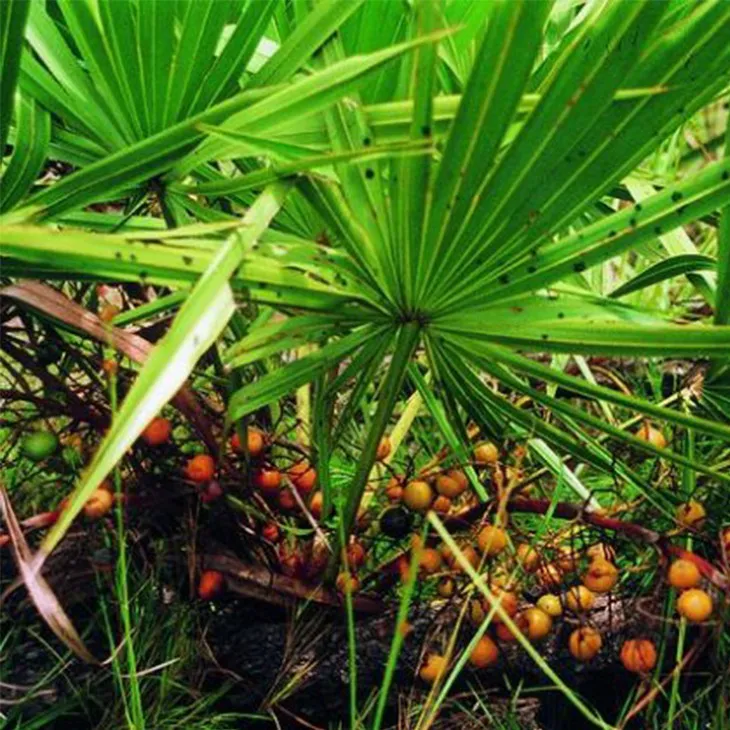- 0086-571-85302990
- sales@greenskybio.com
How to Extract Saw Palmetto Extract by Steam Distillation.
2024-11-28

1. Introduction
Saw palmetto (Serenoa repens) is a small palm native to the southeastern United States. Its extract has been widely used in traditional medicine, particularly for prostate health. Steam distillation is one of the common methods to obtain the extract from saw palmetto berries. This article will take you through the process step by step, as well as discuss safety precautions and potential challenges.

2. Raw Material Selection
2.1. Quality of Saw Palmetto Berries
The quality of the saw palmetto berries is of utmost importance. Fresh and ripe berries are preferred. Berries that are damaged or diseased should be avoided as they may contain contaminants or have reduced levels of the active compounds. It is essential to source the berries from a reliable supplier or harvest them from a clean and unpolluted environment.
2.2. Cleaning the Berries
Once the berries are obtained, they need to be thoroughly cleaned. Remove any debris, leaves, or twigs that may be mixed with the berries. This can be done by gently washing the berries in clean water. However, it is important to note that excessive washing may lead to the loss of some water - soluble compounds. After washing, allow the berries to dry completely. This can be achieved by spreading them out in a well - ventilated area away from direct sunlight.

3. Steam Distillation Equipment
3.1. The Distillation Apparatus
A typical steam distillation apparatus consists of a still, a condenser, and a receiver. The still is where the saw palmetto berries are placed and steam is introduced. The condenser cools the vapor produced during distillation, causing it to condense back into a liquid. The receiver is used to collect the distilled extract. The apparatus should be made of materials that are resistant to corrosion, such as glass or stainless steel.
3.2. Steam Generator
The steam generator is another crucial component. It provides the steam required for the distillation process. The steam should be of a consistent pressure and temperature. A reliable steam generator can ensure the efficiency and reproducibility of the distillation process. There are different types of steam generators available, including electric - powered and gas - powered ones. The choice depends on the availability of resources and the scale of the extraction operation.

4. The Steam Distillation Process
4.1. Loading the Berries
Place the clean and dry saw palmetto berries into the still. Do not overfill the still as this may impede the proper circulation of steam. A general rule of thumb is to fill the still to about two - thirds of its capacity. Ensure that the berries are evenly distributed within the still.
4.2. Initiating the Steam
Start the steam generator and allow the steam to enter the still at a slow and steady rate. The steam will pass through the berries, causing the volatile compounds in the berries to vaporize. The temperature of the steam should be carefully controlled. A typical temperature range for steam distillation of Saw Palmetto Extract is between 100 - 150°C. Higher temperatures may lead to the degradation of some of the active compounds, while lower temperatures may result in incomplete extraction.
4.3. Condensation
As the vapor rises from the still, it enters the condenser. The condenser is usually cooled by circulating cold water around it. The vapor condenses into a liquid as it cools. The condensed liquid, which contains the Saw Palmetto Extract along with some water, is then collected in the receiver.
4.4. Collection and Separation
The collected liquid in the receiver is a mixture of the extract and water. To obtain the pure Saw Palmetto Extract, further separation is required. This can be done through methods such as liquid - liquid extraction or evaporation under reduced pressure. Liquid - liquid extraction involves using an appropriate solvent to selectively extract the active compounds from the water - based mixture. Evaporation under reduced pressure can be used to remove the water, leaving behind the concentrated extract.
5. Safety Precautions
- Steam Burns: Steam is at high temperature and can cause severe burns. Always wear appropriate protective gear, such as heat - resistant gloves and goggles when operating the steam distillation equipment.
- Pressure Build - up: Ensure that the distillation apparatus is properly sealed but also has a pressure - relief mechanism. Excessive pressure build - up can lead to explosions. Regularly check the pressure - relief valve to ensure it is functioning correctly.
- Chemical Exposure: When using solvents for separation, be aware of the potential for chemical exposure. Use proper ventilation in the laboratory or extraction area and wear appropriate respirators if necessary.
6. Potential Challenges
6.1. Incomplete Extraction
If the steam temperature, pressure, or contact time with the berries is not optimized, incomplete extraction may occur. This means that not all of the desired active compounds are obtained from the saw palmetto berries. To overcome this, careful optimization of the distillation parameters is required. Conducting preliminary experiments to determine the optimal conditions can help to improve the extraction efficiency.
6.2. Contamination
Contamination can occur at various stages of the extraction process. From the raw material source, if the berries are contaminated with pesticides or heavy metals, these can end up in the final extract. During the extraction process, improper cleaning of the equipment or use of contaminated solvents can also introduce contaminants. To prevent contamination, strict quality control measures should be implemented, including regular testing of the raw materials and final products.
6.3. Variability in the Raw Material
The chemical composition of saw palmetto berries can vary depending on factors such as the geographical location of growth, the season of harvest, and the variety of the plant. This variability can affect the quality and consistency of the extract obtained. To address this, it is important to standardize the raw material source as much as possible. This may involve sourcing berries from a specific region or variety known for its consistent chemical composition.
7. Conclusion
Steam distillation is a viable method for extracting saw palmetto extract. However, it requires careful attention to raw material selection, proper operation of the distillation equipment, and strict adherence to safety precautions. By being aware of the potential challenges and taking appropriate measures to overcome them, it is possible to obtain a high - quality saw palmetto extract through steam distillation.
FAQ:
Question 1: What are the key factors in selecting raw materials for steam distillation to extract saw palmetto extract?
The key factors include the maturity of the saw palmetto berries. Mature berries are preferred as they contain a higher concentration of the desired compounds. Also, the quality of the raw materials should be ensured, free from excessive contaminants, mold, or damage. Additionally, the origin of the saw palmetto can play a role, as different regions may produce berries with slightly different chemical compositions.
Question 2: How does the steam distillation process for saw palmetto extract work?
Steam distillation involves passing steam through the saw palmetto berries. The steam heats the berries, causing the volatile compounds within them to vaporize. These vaporized compounds, along with the steam, are then condensed back into a liquid. The resulting liquid contains the saw palmetto extract along with water. Further separation techniques may be needed to isolate the pure extract.
Question 3: What safety precautions are necessary during the steam distillation extraction of saw palmetto extract?
First, proper handling of the steam equipment is crucial to avoid burns from hot steam or hot surfaces. Adequate ventilation is required as some of the compounds released during distillation may be harmful if inhaled in high concentrations. Also, when handling the raw materials and the resulting extract, appropriate personal protective equipment such as gloves should be worn to prevent skin contact with potentially irritating substances.
Question 4: What are the potential challenges in the steam distillation extraction of saw palmetto extract?
One challenge is achieving a consistent extraction yield. The chemical composition of the saw palmetto berries can vary, which may affect the amount of extract obtained. Another issue is the potential for thermal degradation of some of the active compounds during the distillation process. Contamination from impurities in the raw materials or from the distillation equipment can also be a problem.
Question 5: How can the purity of the saw palmetto extract obtained by steam distillation be determined?
Various analytical techniques can be used. Chromatography methods such as high - performance liquid chromatography (HPLC) can separate and identify the different components in the extract, allowing for the determination of the purity. Spectroscopic techniques like infrared spectroscopy can also provide information about the chemical composition and thus help in assessing the purity of the extract.
Related literature
- Steam Distillation of Saw Palmetto: A Comprehensive Review"
- "Optimizing Saw Palmetto Extract Production via Steam Distillation"
- "The Science behind Saw Palmetto Extract by Steam Distillation"
- ▶ Hesperidin
- ▶ Citrus Bioflavonoids
- ▶ Plant Extract
- ▶ lycopene
- ▶ Diosmin
- ▶ Grape seed extract
- ▶ Sea buckthorn Juice Powder
- ▶ Fruit Juice Powder
- ▶ Hops Extract
- ▶ Artichoke Extract
- ▶ Mushroom extract
- ▶ Astaxanthin
- ▶ Green Tea Extract
- ▶ Curcumin
- ▶ Horse Chestnut Extract
- ▶ Other Product
- ▶ Boswellia Serrata Extract
- ▶ Resveratrol
- ▶ Marigold Extract
- ▶ Grape Leaf Extract
- ▶ New Product
- ▶ Aminolevulinic acid
- ▶ Cranberry Extract
- ▶ Red Yeast Rice
- ▶ Red Wine Extract
-
Artichoke Extract
2024-11-28
-
Cat Claw Extract
2024-11-28
-
Phyllanthus Emblica Extract
2024-11-28
-
Pueraria Lobata Extract
2024-11-28
-
Jujube Extract
2024-11-28
-
Gynostemma pentaphyllum extract
2024-11-28
-
White Willow Bark Extract
2024-11-28
-
Tormentil Extract
2024-11-28
-
Plantain extract
2024-11-28
-
Black Pepper Extract
2024-11-28





















